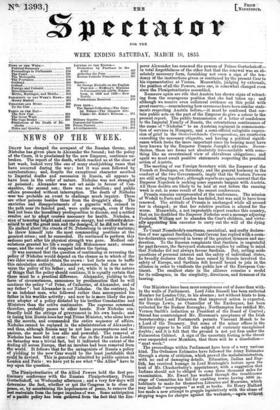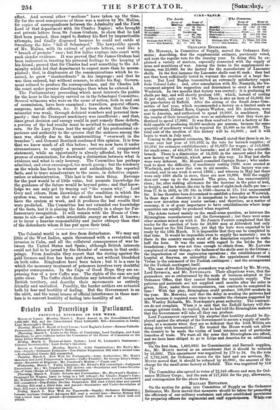Our Ministers have been more conspicuous out of doors than
with- in the walls of Parliament. Lord John Russell has been reelected Member for London City, in his absence ; not without hints to him and his chief Lord Palmerston that improved action is expected. Sir George Lewis, as Chancellor of the Exchequer, has been reelected for the Radnor Boroughs ; Northampton has ratified Mr. Vernon Smith's induction as President of the Board of Control ; Stroud has countersigned Mr. Horsman's acceptance of the Irish Secretaryship; and Portsmouth permits Viscount Monck to be a Lord of the Treasury. But some of the minor offices in the Ministry appear to be still the subject of curiously unexplained doubts ; and it is felt that the ground is not yet firm under the Palmerston Cabinet. A sign of the uncertain footing is the threat ever suspended over Members, that there will be a dissolution- " next week."
The proceedings within Parliament have been of a very various kind. The Ordnance Estimates have followed the Army Estimates through a storm of criticism, which proved the maladministration, with no end of damaging details. Education, Indian and Eng- lish, has received homage in Lord Monteagle's lecture upon the text of Mr. Chuckerbutty's appointment, with a suggestion that Indians should not be obliged to come three thousand miles for examination. Mr. Ewart has worked through -the troublesome stage of Committee his bill for enabling towns having 5000 in- habitants to make for themselves Libraries and Museums, which may include " newspapers " as well as books. Sir Henry Halford has made a new attempt to grapple legislatively with the abuse of stopping wages for charges against the workinen,—agaiu without
effect. And several other " motions " have taken up the time. By far the most conspicuous of these was a motion by Mr.
for copies of correspondence between the Admiralty and the First Lord of that department with Sir Charles Napier ; who brought out private letters from Sir Jamie Graham, to show that he had first been praised, then urged to destroy his fleet by impracticable attempts, and finally disgraced because he could not outdo at Sweaborg the false "fall of Sebastopol." The lawyerlike speech of Mr. Malins, with its extract of private letters, read like a " breach of promise " case ; but few ladies venture into court with such slender evidence. It was proved that Sir James Graham had been indiscreet in trusting his personal feelings to the keeping of his friend ; proved that Sir Charles had sent something to the Ad- miralty which led that department to expect more than he accom- plished; that, in displeasure at the communications which he re- ceived, be grew "insubordinate" in his language; and that he was then ordered, but without censure, to strike his flag. Govern- ment refused to produce the correspondence, and Sir Charles left the court under greater disadvantages than when he entered it. The Parliamentary proceeding which most interests the public for the hour is 'the inquiry carried on in the Sebastopol Committee. several witnesses who were on the scene of action, both in and out of commission, have been examined ; travellers, general officers, surgeons, naval officers, &c. It has been shown that the Com- missariat was weak, through deficient numbers and personal inca- pacity ; that the Transport machinery was insufficient ; and that, since great decision and energy could in part remedy those defects, a portion of the bad results must be ascribed to commanding offi- cers. Sir De Lacy Evans lent the weight of his professional ex- perience and authority to the opinion that the sickness among the men was chiefly due to the unintermitting " overwork in the trenches "; and General Bentinck confirmed this opinion. It is true that we knew much of all this before ; but we now have it under circumstances to supply a present correction of exaggerated statement, while an opportunity is already afforded, by the very process of examination, for drawing a distinction between what is evidence and what is only hearsay. The Committee has perhaps admitted, and even encouraged, too much gossip ; but the tendency on the whole has been to winnow and authenticate the reported facts, and to trace misadventure to the cause, in defective organi- zation or administration. This last is the main thing. Revenge for the past would be of little value, but accurate knowledge for the guidance of the future would be beyond price ; and that know- ledge we can only get by tracing out "the reason why." Lord Grey and others, from knowledge of the condition in which the system was, warned us that we should have bad working: we have the system at work, and it produces the bad results that were predicted. The Committee has not extended our knowledge of the facts, but it is placing the facts formally in a shape for Par- liamentary recognition. It will remain with the House of Com- mons to act—at last—with irresistible energy on what it knows; or to incur a heavier responsibility and juster obloquy than that of the defendants whom it has pat upon their trial.



























